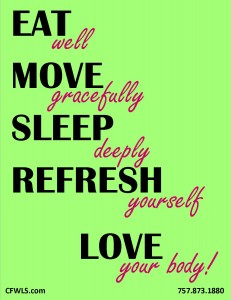
It is a well-known fact that stress causes a number of negative side effects – exercise helps and so does something we take for granted every day of our lives. Sleep!
According to the National Institute of Health, the average adult sleeps less than seven hours per night. Are you average? If so, you may be getting enough to get by but not enough to function at your best!
Your sleep directly affects the quality of your waking life. Mental sharpness, your productivity and emotional balance, creativity and physical vitality, even your weight can be tied to the amount and quality of sleep that you get. No other activity delivers so many benefits with so little effort. While you are asleep, your brain stays busy. Biological maintenance is taking place! Hormones are coaxed back into balance. Energy and efficiency are being restored. But it’s not just the number of hours – the quality of those hours really makes a difference. You may have noticed at times that your sleep is disrupted. Your internal clock can be affected by shift-work, traveling across time zones, irregular sleeping or even too much artificial light at night.
Melatonin is one of the naturally occurring hormones produced as a result of light exposure. It helps regulate your sleep-wake cycle. Spending time away from natural daylight and too much time around bright light at night may suppress your body’s production of melatonin and make it harder to sleep. Try getting in some time in the sun each day and step away from the computer or TV before you turn in for the night. Melatonin is available as a supplement as well, see Cat or Tina in the store if you think this might be for you.
Tips for a Restful Night~
- Set a regular bedtime and don’t change the routine on weekends just because it’s tempting to stay up late. Create a relaxing routine and make sure that your bed is comfortable.
- Wake up at the same time every day. You should be able to wake up without an alarm clock. If this isn’t the case, try going to bed a little earlier.
- Nap to make up for lost time instead of sleeping late. Try an early afternoon nap (30-45 minutes) so that you don’t disturb your natural sleep pattern.
- Avoid falling asleep on the sofa. If you find yourself drifting off after dinner, get up and do something that is mildly stimulating to avoid throwing off your routine.
- Stay away from big meals at night and cut back on caffeine. Caffeine has been known to cause sleep problems as much as 12 hours after drinking it!
- As little as 20-30 minutes of daily exercise will help. The more strenuous exercise should be done earlier in the day but relaxing exercises like yoga or gentle stretching can be done in the evening.
‘Early to bed, early to rise, makes one healthy, wealthy & wise.’ There may be something to that proverb after all!






 Cat Keller has a wealth of experience in marketing, e-marketing, advertising and customer service and manages our Weight Loss Nutritional Store. She is always planning something fun and exciting. special events, discounts, giveaways – it’s never a dull moment. She is happy to help you with questions you may have regarding our products or services. Cat is a graduate of William & Mary, where she studied Government/Pre-Law and minored in Marketing.
Cat Keller has a wealth of experience in marketing, e-marketing, advertising and customer service and manages our Weight Loss Nutritional Store. She is always planning something fun and exciting. special events, discounts, giveaways – it’s never a dull moment. She is happy to help you with questions you may have regarding our products or services. Cat is a graduate of William & Mary, where she studied Government/Pre-Law and minored in Marketing.